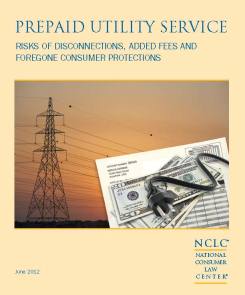Rethinking Prepaid Utility Service: Customers at Risk
Prepaid utility service programs and proposals are expanding rapidly throughout the nation, putting low- and moderate income households’ health and safety at risk, and setting up an inequitable two-tiered customer delivery system. Additionally, many companies add lucrative junk fees to the prepaid customer plans.
Download the full report (PDF)
Download the executive summary (PDF)
Download map of current and proposed programs in the U.S. (PDF)
Download customer service questions that states should require utilities to answer (PDF)
Download the press release (PDF)
New! Download testimony before the California Public Utilities Commission opposing a prepaid program
Prepaid utility service requires customers to pay in advance for their utility service through purchasing credits affiliated with a meter on the home. Once credits are depleted, service is automatically disconnected.
Typically marketed as a program to help customers reduce energy use and avoid paying a deposit, prepaid customers often pay more than traditional credit-based customers. Additionally, it’s misleading to label involuntary reduction in consumption as conservation. Although the program is “voluntary,” it’s frequently offered to low-income customers on the verge of disconnection for nonpayment.
RECOMMENDATIONS
NCLC opposes prepaid utility service but if a state’s regulatory agency allows a prepayment program, NCLC urges that a set of 11 requirements be incorporated to protect customers, including the following:
- Regulatory consumer protections must be maintained or enhanced. This includes limiting or prohibiting immediate disconnection of service, and making available bill payment assistance and forgiveness plans for overdue past bills. The right to dispute bills should be maintained.
- Health and safety risks must be reduced. Prepaid customers should be given a five-day disconnection grace period, and utilities must provide for customers to purchase service credits on a 24/7 basis.
- Vulnerable populations must be protected. Low-income households or households with children, elderly, disabled, or seriously ill members should not be eligible to be enrolled in prepaid utility service programs.
- Marketing of service should be voluntary. Prepaid service should not be presented to customers facing disconnection for nonpayment.
- Junk fees should be eliminated. Security deposits should be not required. Examples of junk fees include: initiation fees, equipment charges, or transaction fees to purchase billing credits or frequent payment fees.
- Prepaid rates should be lower than for comparable credit-based service. The lower rate reflects the lower costs for utilities and shareholder risk.
THE STATE ROLE
- States should require that costs be transparent. Prior to program implementation, utility companies should demonstrate the cost effectiveness of any proposed prepaid service program and detail how costs will be allocated among various classes of customers. Prepaid customers should be allowed to return to credit-based service at no higher cost than that which new customers pay to obtain service.
- States should require utilities to track and report data for prepaid and credit-based customers separately on a monthly basis. Utilities should annually present the data and answer a series of customer service questions.
- States should proactively plan for prepaid customers to have money returned in case of company default.
RESOURCES
- The Need for Essential Consumer Protections, John Howat’s presentation at New York Low-Income Forum on Energy, June 24, 2015

